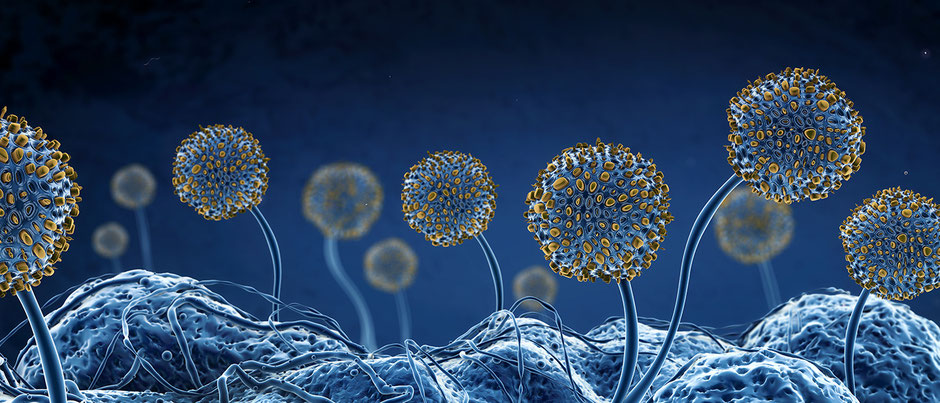Tennee | August 19, 2019

To preface this blog on Mold and MCAS (Mast Cell Activation Syndrome) I would like to just pitch a shout out to all the canaries in the coal mines, you know who you are. You are the ones who get sick when exposed to things that “everyone else can handle”. You may be sensitive to chemicals, have skin reactions to beauty products, are allergic to many foods... you get the picture. I’m citing the canaries because some of the greatest healers I have met are often the most sensitive people.
What is Mast Cell Activation Syndrome?
Have you ever met someone whose eyes are red and puffy, but not from crying, merely from walking outside among some flowering trees? Or the poor soul who only has 5 foods they can eat without a reaction? Or someone who deals with unexplained rashes and itchy skin? These symptoms are likely the result of a chronic condition that creates much-unwanted inflammation on a regular basis. This is mast cell activation at its finest.
Mast cell activation syndrome is an inflammatory condition in which mast cells chronically overreact and release inflammatory chemicals into the body.
A mast cell is a type of white blood cell that is designed to produce and release different signaling chemicals or “mediators” in response to its environment. These chemicals are stored in the cell for rapid release as a line of defense against environmental threats and foreign invaders such as parasites, fungus, bacteria, and viruses. This is a protective part of your immune system designed to aid the immune system in dealing with any internal or external assaults.
A response to pollen is a perfect example of good intentions gone wrong. This happens when the mast cell mistakes the pollen from that of a foreign enemy. This triggers a histamine response in effect to protect the body from harm.
It should be noted that while histamine is the most well-studied response from mast cells, there are over 200 mediators or chemicals that can be released from a mast cell. Other identified chemicals that are better known aside from histamine include cytokines, interleukins, prostaglandins, and chemokines.
/Source: NCBI
Symptoms of MCAS
Mast cell activation syndrome occurs when the mast cell receives a constant signal to react (from some foreign invader/substance). This triggers the mast cells to release inflammatory chemicals into the body. This chronic multi-system release of mediators triggers a cascade of inflammation. This is most notable with hay fever and allergies. However, it is important to note that mast cells are in high concentrations all throughout the body and the symptoms will mimic the system that they are affecting.
This means if you have a mast cell overreaction in the GI tract, it may cause symptoms such as vomiting and diarrhea or look like IBS. If you have mast cells activated in your brain, it can cause fatigue, depression, anxiety and panic disorders. In the bladder, it can cause chronic inflammation as in Interstitial Cystitis. The skin is likely to show rashes and hives.
/Source: NCBI
Mold and MCAS?
It is important to take into consideration that MCAS is a protective defensive reaction that your body mounts in response to a foreign invader that the body does not recognize. This means that its crucial to look at your environment: both internally and externally. Mold is one of the largest drivers of MCAS known, as it activates mast cells to secrete pro-inflammatory cytokines into the body causing systemic inflammation. The second largest driver comes in the form of infection.
/Source: NCBI
Mold is an insidious health issue that often gets overlooked (similar to Lyme disease). It is often the result of water damage in buildings and can go undetected very easily. The exposure to mold can create an inflammatory cascade of problems caused by a release of cytokines that most people don’t recognize until their symptoms become clustered enough for a specialist to recognize. If you suspect that you may be dealing with a mold-related illness it is imperative to have your home tested. The ERMI and HERSTMI testing are the gold standards for mold testing at this time.
My own story with mold and MCAS
Honestly, I spent years trying to figure out why I was inflamed. It took 6 months after moving into a house that had a hidden mold problem for my body to start reacting. However, it’s important to note that the mold was hidden we so we didn’t suspect anything environmental. After too many trials and errors, I realized that the chronic bladder condition I was dealing with called IC or interstitial cystitis was the result of MCAS. This, in turn, was the result of mold exposure. Before realizing that the MCAS was born of mold, I spent years working with well-meaning specialists knocking down layer upon layer of infection thinking hidden Lyme or co-infections were the cause of my bladder issues. However, despite the antibiotics and herbs I was taking, the inflammation was never permanently alleviated. Fast forward a few years (I know, its crazy how long it took) after taking every herb known to man to rebuild the GAG layer in my bladder I couldn't figure out why my bladder lining was not healing. However, I finally started to move the needle when I gave up my black tea and started antihistamine support. The mold testing came last, and in hindsight, it should have come first, but I suppose everything happens for a reason, and I now know a lot about chronic inflammatory conditions!
Four steps that helped me identify that I had an MCAS/mold issue
- I had my data analyzed from 23andme and I looked at my histamine SNPs to see if the DAO enzyme SNPs were working properly. As it turned out, most of my SNPs showed an impaired ability to break down histamine y
- I noticed that whenever we left the house for a vacation that my symptoms would get better.
- I noticed during my period when estrogen was the lowest that I didn’t have any pain in my bladder. This is common with MCAS.
- We tested our house for mold and it came back positive.
Testing for MCAS

If you are looking for markers that correlate with mold toxicity, these biomarkers are more common than others.
- MMP-9
- C4a
- TGF beta
- VEGF
Genetic SNPs that may indicate a difficulty in methylation which will affect your ability to process and breakdown histamines include:
- MTHFR SNPs
- DAO and MAO SNPs
Foods that support the breakdown of histamine include:

- stinging nettle
- artichokes
- apple peels
- arugula
- ginger
- red onions
- pomegranates

Supplements that help MCAS include natural antihistamines and mast cell stabilizers include:

- butterbur
- quercetin
- omega 3
- glutathione
- DAO enzymes
- turmeric
- methyl folate
- vitamin B6
- P5P
- vitamin B12
- resveratrol
- vitamin C
- Lactobacillus Rhamnosus
Foods to avoid on a low histamine diet:

- alcohol and fermented drinks
- black tea/green tea/ coffee
- citrus
- banana and avocado and dried fruit
- soured foods, sourdough bread
- processed and cured meats
- spinach
- eggplant
- tomatoes
- chocolate and cacao
- dairy
The biggest lesson I have learned on my journey is to leave no stone unturned. There is always an answer no matter how difficult the health issue. There are a lot of chronically sick mold patients who are given prescriptions to manage and suppress symptoms by well-meaning health care providers that are not educated in mold toxicity. Make sure to find health care providers that can offer you the proper channels of support.
Wishing you a Radiant Reality!

Thanks for reading my blog.
If you like this please share!

Write a comment